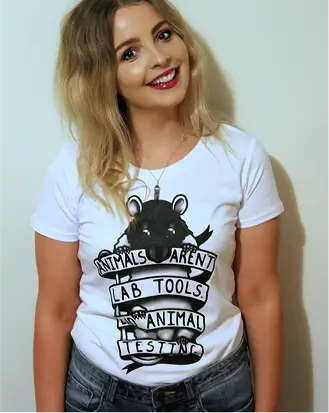For Animals
It’s well known that animals are sentient and capable of experiencing a wide range of emotions including pain and fear. This is even recognised in New Zealand law.
An end to animal experimentation would protect animals from having to endure these negative emotions and experiences and would ultimately save countless lives.
Ending animal experimentation would benefit animals in many ways…
1. Animals are forced to endure painful and traumatic experiences
Every year, thousands of animals are made to endure extreme pain or discomfort during experiments in NZ. In fact, we regularly discover and expose cruel experiments!
For example, during one of our most shocking Christmas campaigns, we exposed 11 horrifying experiments that had happened at the University of Otago.
They included force-feeding young rats alcohol, damaging their brains, making them balance with chronic pain or blasting their ears to give them tinnitus. Mice were stressed for weeks and made to endure the notorious Forced-Swim-Test. Young rabbits had holes drilled into their jaw, and guinea pigs had holes drilled into their inner ears. Sheep were bled to death and honey bees got electric shocks to their brain. Find out more here.
2. ANIMAL EXPERIMENTATION IS NOT OPTIMISED FOR ANIMALS
- Animals are often kept at the bare minimum of housing conditions. Rodents in stacked, small cages, often by themselves and without enrichment. These animals are most likely under stress which has an impact on study results.2
- A review of 228 animal studies found that animals in research are not adequately safeguarded.3
- Many animal studies were of poor quality and poor animal welfare levels.
- Few made animal welfare statements.
- Few stated the use of pain relief or other post-operative care.
- The most common harm assessment was “severe”.
- Isolation and lack of enrichment cause behavioural problems4 and even changes in their brains.5
- It is a known problem that the often cited “animal welfare” is too often less than perfect.6
3. ANIMALS ARE BRED FOR RESEARCH, BUT SIMPLY KILLED IF THEY’RE NOT NEEDED
Hundreds of thousands of animals are bred in excess, just to be killed when they are not needed.
4. ANIMALS ARE EXPERIMENTED ON SO THEY CAN BE ‘BETTER’ EXPLOITED
- A lot of research conducted on animals in NZ is done for the animal agriculture industry so that animals can be more ‘efficiently’ exploited.
- You can find many examples on our case studies page about cattle. In one experiment, calves were killed with different methods to see if it really makes a difference whether they are stunned before their throat is cut.8 Other experiments involve testing fertility treatments to try and make cows pregnant faster,9 testing different diets to make them grow faster,10 and testing treatments for udder infections. 11 The ultimate purpose of experiments like these are to try and maximise the profits of animal agriculture.
- We've exposed a shocking experiment where piglets were suffocated in a gas chamber trying to find out if perhaps a different gas or gas combination causes less stress for the piglets before they die.
- Young animals like goats are subjected to research into how to best remove the horn buds, including hot iron and chemical removal.12
- Research aimed at reducing the impact of animal agriculture on the environment is also common.13
- Research into non-invasive control of unwanted species (like stoats and possums), takes not only their right not to suffer into consideration, but it can also benefit our native species. Wild-caught cats have been used in several studies to assess the effects of different toxins to kill them. Read more about unwanted species control here.
- https://www.mpi.govt.nz/animals/animal-welfare/animals-research-testing-teaching/statistics-on-the-use-of-animals-in-research-testing-and-teaching/
- https://doi.org/10.1186/s12915-021-01184-0
- https://doi.org/10.1371/journal.pone.0193758
- https://doi.org/10.1093/ilar.46.2.106
- https://doi.org/10.1016/s0166-2236(00)01718-5
- https://doi.org/10.1038/35089208
- https://www.mpi.govt.nz/animals/animal-welfare/animals-research-testing-teaching/statistics-on-the-use-of-animals-in-research-testing-and-teaching/
- https://mro.massey.ac.nz/handle/10179/1010
- https://doi.org/10.1016/j.theriogenology.2014.06.004
- https://doi.org/10.1016/j.livsci.2020.104031
- https://doi.org/10.3168/jds.S0022-0302(07)71562-X
- https://doi.org/10.3168/jds.2017-13814
- https://www.rnz.co.nz/national/programmes/insight/audio/2018645479/insight-farming-and-the-fight-against-climate-change





